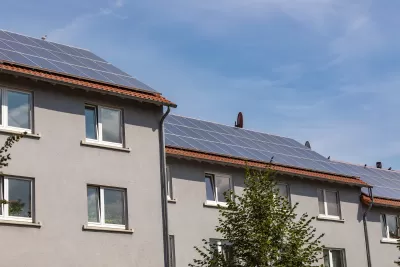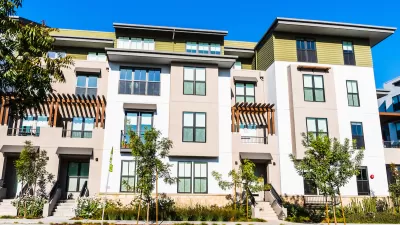A new program will fund solar panels, heat pumps, and other measures aimed at reducing emissions, improving air quality and resident health, and reducing heating and cooling costs.

The U.S. Department of Housing and Urban Development (HUD) is funding energy efficiency retrofits and equipment for HUD-assisted multifamily properties through a new program known as the Green and Resilient Retrofit Program (GRRP), announced a press release published on May 11.
The Inflation Reduction Act provided HUD with $837.5 million in grant and loan subsidy funding and $4 billion in loan commitment authority for this new program. The law also includes $42.5 million for a new HUD initiative launching later this summer to collect and assess energy and water usage data from HUD-assisted multifamily housing properties to better target opportunities to save energy and water, cut costs, and reduce emissions.
According to the press release, “Building owners will be able to invest in technologies, such as solar panels, heat pumps, wind-resistant roofing, insulation, low embodied carbon materials, and other measures that will reduce greenhouse gas emissions and make properties healthier and safer for residents in the face of more severe weather and a changing climate.”
The press release notes that “GRRP is the first HUD program that simultaneously invests in energy and water efficiency, greenhouse gas emissions reductions, clean-energy generation, and climate resilience strategies in multifamily housing.”

Planetizen Federal Action Tracker
A weekly monitor of how Trump’s orders and actions are impacting planners and planning in America.

Maui's Vacation Rental Debate Turns Ugly
Verbal attacks, misinformation campaigns and fistfights plague a high-stakes debate to convert thousands of vacation rentals into long-term housing.

Restaurant Patios Were a Pandemic Win — Why Were They so Hard to Keep?
Social distancing requirements and changes in travel patterns prompted cities to pilot new uses for street and sidewalk space. Then it got complicated.

In California Battle of Housing vs. Environment, Housing Just Won
A new state law significantly limits the power of CEQA, an environmental review law that served as a powerful tool for blocking new development.

Boulder Eliminates Parking Minimums Citywide
Officials estimate the cost of building a single underground parking space at up to $100,000.

Orange County, Florida Adopts Largest US “Sprawl Repair” Code
The ‘Orange Code’ seeks to rectify decades of sprawl-inducing, car-oriented development.
Urban Design for Planners 1: Software Tools
This six-course series explores essential urban design concepts using open source software and equips planners with the tools they need to participate fully in the urban design process.
Planning for Universal Design
Learn the tools for implementing Universal Design in planning regulations.
Heyer Gruel & Associates PA
JM Goldson LLC
Custer County Colorado
City of Camden Redevelopment Agency
City of Astoria
Transportation Research & Education Center (TREC) at Portland State University
Jefferson Parish Government
Camden Redevelopment Agency
City of Claremont





























